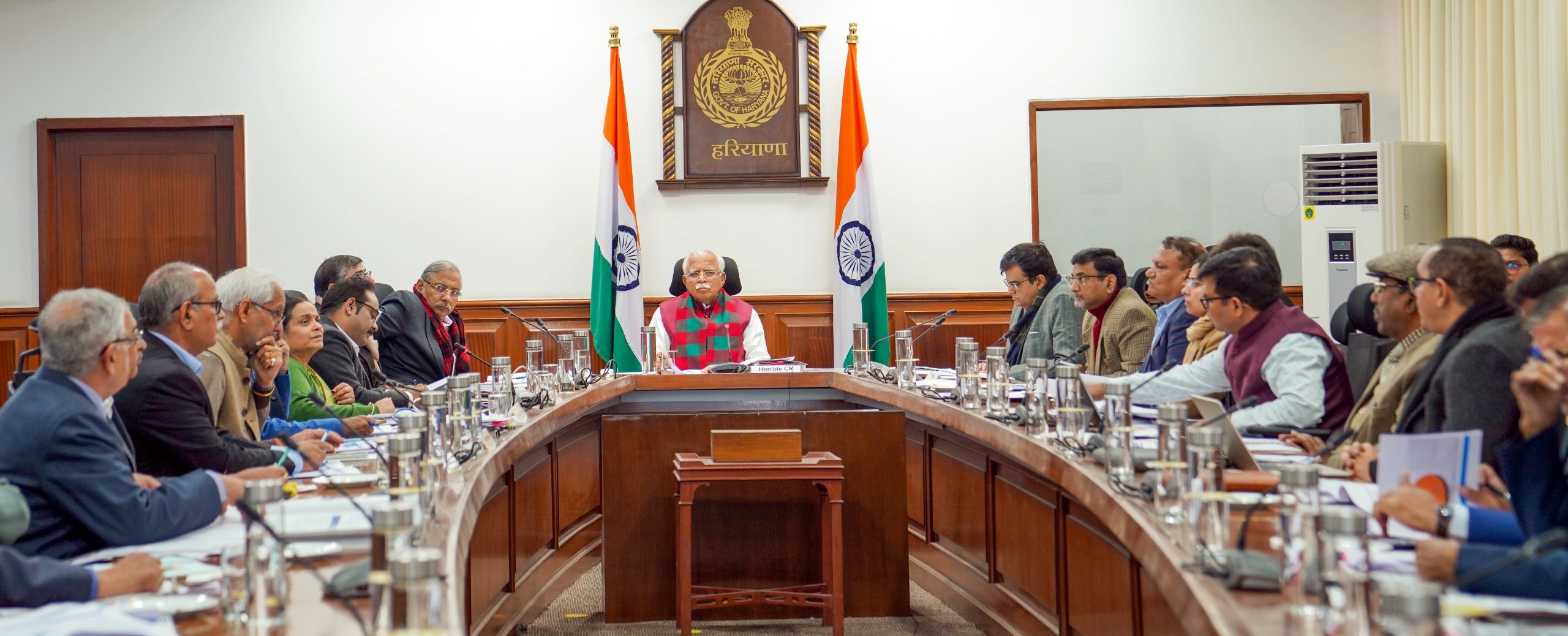
Chandigarh, January 18 – Taking a significant step towards water conservation and reducing the gap between water availability and demand in Haryana, positive results of the Biennial Water Action Plan (2023-2025) have started to show on the ground. The plan aimed to save 260,498 crore liters of water by December 2023, and it has successfully achieved 95 per cent of its goal, saving 248,702 crore liters of water.
This information was shared during a meeting of the Haryana Water Resources Authority chaired by Chief Minister, Sh. Manohar Lal here today.
During the meeting, the Chief Minister directed officers to prioritize implementing groundwater recharging plans in villages where the groundwater level is critically low. Similarly, areas facing recent water logging issues should be addressed first to expedite their recovery. He emphasized the need for swift action to meet the targeted water savings by March 2024.
In areas where water logging is an issue but the groundwater level is considerably low, scientific studies should be conducted for groundwater recharging
Sh. Manohar Lal said that there are areas in Haryana facing water logging issues with significantly low groundwater levels. Excessive use of chemical fertilizers is a major cause, leading to the compaction of soil layers and clay formation, hindering water infiltration into the ground. Scientific studies should be conducted to address groundwater recharging in these areas, he said.
The Chief Minister stressed the importance of coordination among all relevant departments in the water conservation campaign.
“Each district should map short-term plans and ensure their effective implementation. Verification mechanisms should be established at the district and block levels, and senior officers should be assigned to ensure accurate data reporting,” he directed.
The Chief Minister further directed the officers to identify around 200 villages where the groundwater level has fallen below 100 meters and create a list. The Agriculture Department should encourage farmers in these villages to adopt micro-irrigation techniques, he said.
Sh. Manohar Lal directed that feeder should be marked in areas where the groundwater level has reached up to 30 meters, and 100 percent solar energy-driven pumps should be installed for irrigation purposes.
He said that continuous monitoring of rainwater harvesting systems in government buildings should be done to ensure consistent storage of rainwater.
The Chief Minister emphasised the need for ongoing awareness campaigns to encourage farmers to conserve water. Water conservation is an ongoing initiative, and the Information, Public Relations, Language, and Culture Department should conduct awareness campaigns, he said.
Chief Minister praised Water Resources Authority for commendable work
During the meeting, the Chairperson of the Haryana Water Resources Authority, Mrs. Keshni Anand Arora, informed the Chief Minister that HWRA has developed in-house online software for granting NOCs for extraction of groundwater to Industry, Mining, and infrastructure/Commercial entities and so far, granted permission to about 3022 applicants with the condition to water conservation and recharge of ground water by ensuring rainwater harvesting and optimum use of treated wastewater for non-potable use and generated Rs. 142.80 Crores as tariff and application fee.
She further informed that during the year 2022-23, HWRA has funded Rs. 65.01 Crores for water conservation projects to the Irrigation and Water Resources Department. HWRA has given an amount of approximately Rs. 4.30 crores for 237 rooftop rain water harvesting structures in schools in the state of Haryana. During the year 2023-24, HWRA has agreed to share an amount of Rs. 21.70 Crores towards Water Conservation Projects of Irrigation and Water Resources Department, she added.
The Agriculture Department, through various improvement measures, has saved a total of 173,369 crore liters of water
Mrs. Keshni Anand Arora, informed that under the biennial water action plan (2023-2025), successful initiatives include direct seeding of rice using the DSR technique in 2,45,493 acres, crop diversification in 2,44,464 acres, and the construction of 26 water reservoirs for floodwater conservation by the Irrigation and Water Resources Department.
She highlighted the significant role played by the Agriculture and Farmer Welfare Department in the plan, adopting various improvement measures, resulting in a water savings of 173,369 crore liters. She further shared that the Irrigation and Water Resources Department has saved 16,627 crore liters of water by modernizing/rehabilitating channels, constructing new storage facilities for floodwaters, and reusing treated effluent water.
Chief Secretary, Sh. Sanjeev Kaushal, Additional Chief Secretary, Environment, Forest and Wildlife Department, Sh. Vineet Garg, Additional Chief Secretary, Town and Country Planning Department, Sh. Arun Kumar Gupta, Advisor (Irrigation) to Chief Minister, Sh. Devender Singh, Commissioner and Secretary, Irrigation and Water Resources Department, Sh. Pankaj Aggarwal, Commissioner and Secretary, Urban Local Bodies Department, Sh. Vikas Gupta, Additional Principal Secretary to Chief Minister, Smt. Ashima Brar, Director, Agriculture Department, Sh. Rajnarayan Kaushik, Executive Vice Chairperson, Haryana Pond and Waste Water Management Authority, Sh. Prabhaker Kumar Verma, Vice Chancellor, Chaudhary Charan Singh Haryana Agricultural University, Hisar, Prof. B R Kamboj and other officers also remained present on this occasion.



